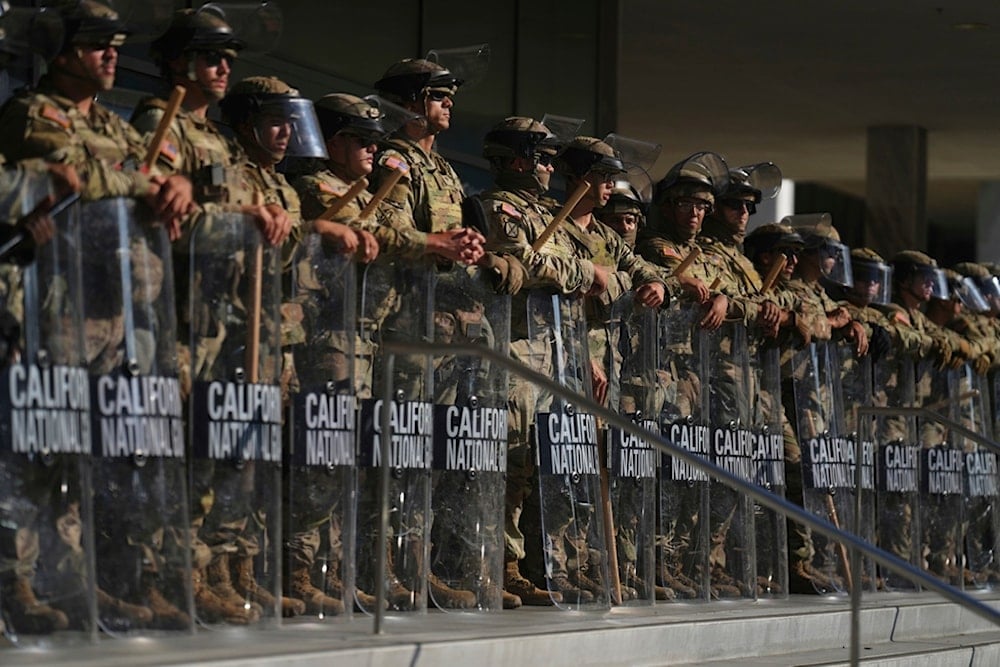Trump calls immigrants 'animals', LA deployment cost hits $134 mln
The deployment of 2,700 US troops to Los Angeles by Trump has sparked controversy, with state officials opposing the move and questioning its legality.
-

California National Guard guard the Federal Building on Tuesday, June 10, 2025, in downtown Los Angeles (AP)
US President Donald Trump on Tuesday labeled the anti-immigration protesters in Los Angeles as “animals” and a “foreign enemy” during a speech at Fort Bragg, where he oversaw a missile strike simulation, a helicopter attack, and a building raid carried out by the US Army.
Trump’s decision to mobilize 2,700 military personnel, including 700 US Marines and 2,000 National Guard troops, to Los Angeles has drawn sharp criticism from California officials and Democratic lawmakers.
The operation, expected to last at least 60 days, is projected to cost US taxpayers a minimum of $134 million, according to US Defense Secretary Pete Hegseth, who testified during a House appropriations hearing on Tuesday.
The deployment began Monday, with federal troops arriving in Los Angeles to reinforce law enforcement amid intensifying anti-immigration protests. California Governor Gavin Newsom and Los Angeles Mayor Karen Bass have publicly opposed the federal mobilization.
Protests erupted following immigration raids last week that resulted in over 40 arrests. Demonstrators accused Immigration and Customs Enforcement (ICE) agents of targeting undocumented individuals unfairly.
Protests expand beyond LA
The Associated Press mentioned that the protests have now expanded beyond Los Angeles, with demonstrations reported in cities including Seattle, Austin, Chicago, and Washington, DC, as protesters blocked roads, held vigils outside government buildings, and clashed with police in some locations.
“The current cost estimate for the deployment is $134 million, which is largely just the cost of travel, housing and food,” indicated Bryn Woollacott MacDonnell, special assistant to the secretary of defense, during the House subcommittee meeting.
Read more: UN calls for demilitarization at the Los Angeles protests
Federal overreach, legal backlash
Trump’s move to send troops without securing state approval has been criticized as an example of federal overreach. California has since filed a lawsuit against the Trump administration, asserting the mobilization violates state sovereignty.
The deployment was justified by Trump officials under federal statutes that allow for military involvement in cases of invasion, rebellion, or the inability to enforce federal law. But lawmakers have challenged the application of these provisions.
Crowds blocked major highways and set vehicles on fire over the weekend. In response, local police used tear gas, rubber bullets, and flash-bang grenades. Los Angeles Police Chief Jim McDonnell stated that the arrival of military forces, without proper coordination, posed a challenge to law enforcement efforts to de-escalate tensions.
Hegseth defends troop deployment
During the House appropriations subcommittee hearing, Hegseth defended the troop mobilization, stating it was necessary to support ICE and protect law enforcement officers.
“We stated very publicly that it’s 60 days because we want to ensure that those rioters, looters and thugs on the other side assaulting our police officers know that we’re not going anywhere,” he said.
California Representative Pete Aguilar questioned the legal basis for deploying troops in a domestic law enforcement context.
“What’s the justification for using the military for civilian law enforcement purposes in LA?” Aguilar asked.
Hegseth responded that the law allowed for action in situations that appeared to meet the conditions of rebellion or inability to enforce federal law.
Trump claimed he had spoken to Governor Newsom “a day ago” regarding the protests, but Newsom contradicted the claim on social media, saying, “There was no call. Not even a voicemail.”
Accusations of misinformation, miscommunication
“Americans should be alarmed that a President deploying Marines onto our streets doesn’t even know who he’s talking to,” Newsom wrote on X. The lack of communication has only intensified concerns about the federal government's coordination with state leadership.
Meanwhile, Hegseth was questioned on the necessity of deploying Marines to Los Angeles when a similar response was not used during the 2020 unrest in Minneapolis. He responded by pointing to concerns expressed by local law enforcement in Los Angeles.
“The police chief said she was overwhelmed, so we helped,” he said.
The secretary is expected to return to Capitol Hill on Wednesday for a follow-up hearing before a Senate appropriations subcommittee.

 4 Min Read
4 Min Read










